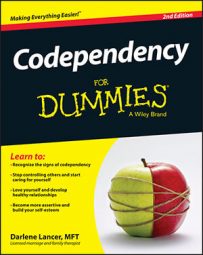Many people, particularly women, enjoy nurturing and caring for others. Some make it a profession. Mothers are wired to care for their children. Codependent caretaking is different from giving care to someone. In fact, with codependency, there may be more taking than giving when the needs of the giver take precedence. This is because caregiving comes from abundance, and caretaking emanates from need and deprivation.
When does caregiving become codependent caretaking? Read the following cases, and decide for yourself.
Jill and Jane quit their jobs, each to care for her dying mother; one woman is codependent, and the other isn’t. Take a look at the following cases, and think about what makes one codependent.
Jill enjoys her job. She is the only relative who can care for her mother. Reluctantly, she realizes spending the last months of her mother’s life with her is a priority, so she leaves her job. She arranges for part-time help a few days a week in order to make time for herself. Jill exercises, talks to friends for support, and does her best under the circumstances to maintain balance and harmony in her life, which nurtures both her and her mother.
Jane feels obligated to leave her job to help her mother. She blames and resents her siblings for not sharing her burden, yet doesn’t ask that they pitch in. She feels responsible for and worries about her mother’s medical treatment. She spends all day with her mother and tries unsuccessfully to convince her to see a faith healer. Her mother encourages her to get some rest, but Jane feels too guilty and preoccupied to take time for herself and is tired all the time.
Jane’s codependent caretaking has inappropriate responsibility and control written all over it. She feels guilty and resentful because she feels responsible for her mother, yet she neglects her responsibilities to herself. Jane takes over her mother’s treatment, gives unwanted advice, and doesn’t ask others for help so she can maintain control. Finally, she’s too worried and guilty to take care of herself, even though her mother seems to need her less than the daughter acknowledges. Jill, however, gives care to her mother, but doesn’t neglect her needs, so she doesn’t become resentful. Codependents give until it hurts.

